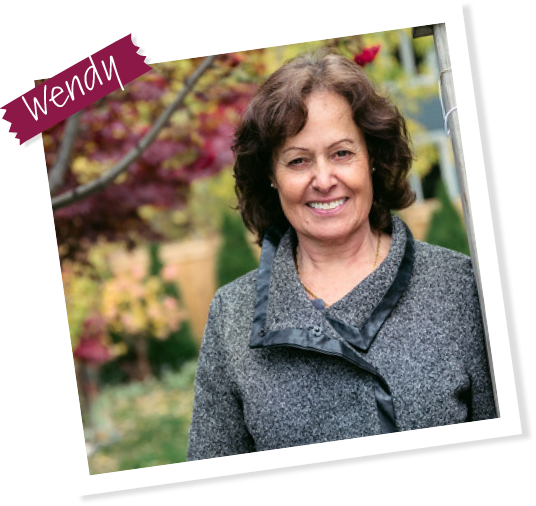Wendy, caring for her daughter
 My caregiving experience began over two decades ago. My youngest of three children who is now 35, has been suffering from anorexia nervosa and bulimia for that long. I was a pre-school teacher and a volunteer at SickKids for many years, where I would do scrapbooking with children. But once my daughter got too sick, I had to stop volunteering to care for her. My husband and I were absolutely thrown into the deep end, and were shocked at the lack of resources, empathy, and information regarding eating disorders being a mental condition.
My caregiving experience began over two decades ago. My youngest of three children who is now 35, has been suffering from anorexia nervosa and bulimia for that long. I was a pre-school teacher and a volunteer at SickKids for many years, where I would do scrapbooking with children. But once my daughter got too sick, I had to stop volunteering to care for her. My husband and I were absolutely thrown into the deep end, and were shocked at the lack of resources, empathy, and information regarding eating disorders being a mental condition.
In desperation, in 2012, I started our organization with our nurse psychotherapist who specialized in treating eating disorder individuals. It was dedicated to raising awareness, understanding and action on behalf of families like ours. Since the organization’s launch, my phone has not stopped ringing from people going through similar experiences. Our daughter was 16 when it began, and at the time, there was such a lack of knowledge on eating disorders or support for patients. It is not uncommon for people with eating disorders to shoplift for food, and a few times she went through the court system. I was so scared and lost when my daughter told me how she was treated by one sergeant when she was arrested. He didn’t know about the mental state of eating disorders and treated her so poorly. The court system is not for anyone with a mental disorder. It caused us so much emotional trauma. My husband and I would worry, panic, and stress out wondering what we did wrong and why she was suffering like this.
Her physical and psychological situation resulted in her having two accidents after which she stopped driving and I began driving her. One year, I drove her to Emergency 20 times to be rehydrated. Even at the hospital some doctors didn’t understand her mental illness and treated her poorly. Eventually, we asked her to come and live with us so that we could care for her as her eating disorder would cause her to leave her home in the middle of the night, looking to binge.
That’s when I started caring for her 24/7. There were a couple of years where she had two overdoses and we thought she was going to die at any moment. I felt most scared then, but we were also filled with anger resentment and fury thinking about why she was doing this to herself. We got our answers when she participated in a study that showed how starvation and electrolyte imbalance had caused much of her brain cells to become dormant and her cerebrospinal fluid had taken over a larger portion of her brain. This helped explain why her comprehension was so impaired. It was only after this realization and after I started seeing a psychotherapist that I changed my perspective. I realized it wasn’t her fault and that it was her mental illness showing her a distorted reality and further distorting her comprehension as she starved herself.
For the last 16 months, she has been able to regain a huge amount of her life back and is driving again. This is partially thanks to a friend she made at my mother’s retirement home that has shown her a positive perspective on life. She has truly been a bright light in her life. Also, since COVID, she has been able to make greater strides by being able to participate in eating disorder groups on Zoom, which she would not have otherwise done in person. It was so heartwarming to hear that she is the happiest now than she’s been since she was 14. She has a way to go but she is on a road to wellness.
Caregiving is not linear, and it’s filled with doubt. At one stage, our only hope was to not get a phone call informing us that she had died, and it seemed like she would never find happiness. She has. Remember as a caregiver that no matter how much you are hurting, they are hurting more, so celebrate all their small successes and give them unconditional love – they need it.
